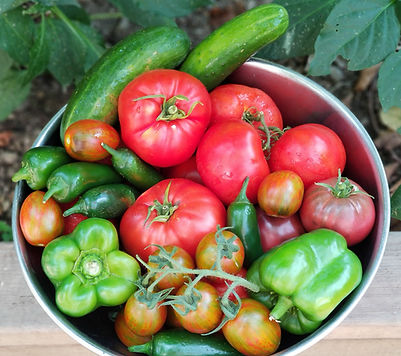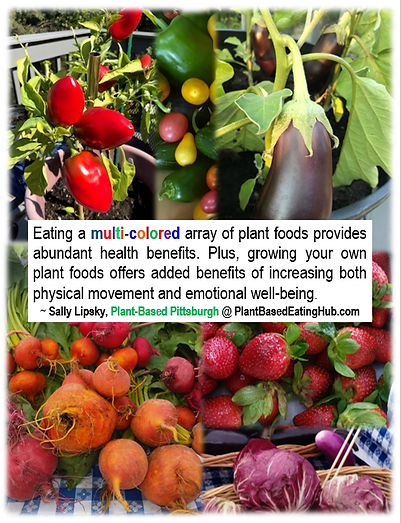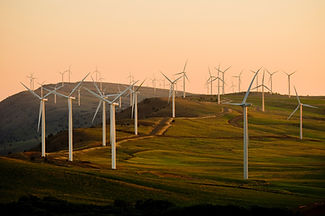
ReImagine TCWAC+ Working Groups
Constant communication through the Turtle Creek Watershed and Airshed communities and actively engaged working groups have united to create a working model of self-inquiry, storytelling, and community projects to progress our present to our future. Five working groups have been established to identify the five distinct passions of our community. Through capitalizing on local ingenuity, innovation, and motivation, we seek to implement regenerative future projects.
Backyard Garden Program
ReImagine Food Systems’ garden program is a local initiative dedicated to increasing community access to healthy, fresh produce and pollinator-friendly places through regenerative gardens. Providing materials, resources, and education we hope to eliminate barriers to home gardening and foster a connection between people, food, and the earth. The best way to build that connection is for people to get their hands in the dirt and learn how to care for flora and fauna right in their own backyard. It is a beautiful site to see the change a garden brings.
What are the benefits of a backyard garden?
-
Helps you eat more fresh fruits and vegetables.
-
The shorter the distance from harvest to table the healthier the food.
-
You choose what fertilizers and pesticides to use in your garden.
-
You control when to harvest your food allowing you to pick them when they are ripe and full of nutrients.
-
Increase the number and diversity of insects in your backyard
While people may want to enjoy the benefits of a garden there are often hurdles that keep them from that goal. This program aims to make backyard gardening accessible to families and elderly in need. If you live in the Turtle Creek Watershed this could be a great opportunity. Right now candidates are being accepted in and around Trafford.
Photos from Our 1st Installation!




Backyard Garden program provides:
-
Soil testing for toxins
-
One or two 3’x5’X12” raised garden beds for vegetable depending on space
-
Seeds or plants appropriate for the season
-
Guidance on maintaining a garden
-
A follow up appointment to answer questions and teach about weeding
-
A contact to answer questions during business hours
We encourage anyone who is interested to apply. We can never have too many gardens and we will work to accommodate as many households as possible. We're already filled up for the fall, but if you are interested please fill out the spring application form here. If you have any questions please contact us at reimaginetcwac@gmail.com. In 2021, we are hoping to expand the program to include pollinator gardens for participants who are not eligible for vegetable gardens.
How we are doing it:
We are selecting participants for the 2020 fall program according to the following criteria: 1) order in which applications are received and (2) pass soil testing for toxic contaminants.
Our program works with participants for 2 years. In the first year, we provide 3 site visits in a growing season. During our first site visit, we will assess the outdoor area, collect soil samples, and go over details about how our program works, including what materials we provide, and sign a participant agreement. Should the soil samples indicate good results for growing produce for eating, we will move onto the second step. Our second site visit involves installation of the raised garden beds and soil and compost. We encourage participants to be active in learning to plant seedlings and education topics. The third visit occurs 2-4 weeks after installation to check-in on the area. During this time, we provide information about weeding and pests and harvesting.
The second year, we provide 2 visits. On the first visit, we provide seedlings and compost and provide education on amending soil. The second visit occurs 2-4 weeks later when we review information about weeding, pests, and harvesting.
After each garden is installed, Homegrown keeps in touch throughout the season, offering participants:
-
Regular check-ins and garden visits to answer question
-
Information on Organic and Integrated Pest management practices
-
Help getting started again the second year

_j.jpg)


Common words & definitions
-
Sustainability: the ability to exist constantly. In the 21st century, it refers generally to the capacity for the biosphere and human civilization to coexist
-
Regenerative: tending to or characterized by regeneration.
-
Closed-loop compost: the food scraps and other organics generated never leave and are turned into compost on-site.

ReImagine Food Systems
Background & Actions
Health and wellness is something that this group feels should be a priority in everyone’s lives. Taking care of yourself and putting your health first in a sustainable way is something that everyone can make happen for themselves. All that it takes is listening to what works for your body, realizing how your current health and wellness practices are impacting the environment, and having a little bit of guidance from Re-Imagine TCWAC+’s Health & Wellness group, of course!
While health and wellness are fairly broad topics, this group was established to be a source that people can connect with in order to analyze and share their gifts in the context of these topics. Because the internet is such a convenient place to find information, the Health & Wellness Team has set out to create an online presence to make this happen. So far, a website domain name has been purchased and a podcast (“Journey Through Health & Wellness”) has been started. Once a website is up and fully functioning, it will serve as a place for the group to post links to the podcast series, share information relating to the podcast topics, and to raise awareness of other fitting sustainability topics. Currently, the podcast can be found on www.anchor.fm and some other streaming services such as Spotify. ReImagineTCWAC@gmail.com is available for listeners and website visitors to send in questions, comments, and even requests to be featured on the podcast! The podcast itself is a very exciting opportunity to spread the word about the importance of living a healthy, sustainable lifestyle.



Health & Wellness

Our Mission Statement
The TCWAC+ process has included single-use plastic awareness from the beginning: in which one way is advocating how plant-based diets would use fewer plastics from processing and packaging. All meetings have used non-disposable serving ware and have presented information about the dangers of continuing the dependence on single-use plastic. The ubiquitous plastic packaging makes consumer-driven efforts difficult. The Single-Use Plastics working group has been a small number, with concerns focused on institutional SUP use in schools and hospitals. Efforts to revise procurement practices will entail changes in what are perceived as safety measures during the current COVID-19 pandemic. This has placed a new hurdle in the effort to reduce or eliminate single-use plastics.
There are significant measures individuals can take to address the single-use plastics on a daily basis. First is to Refuse single-use plastics such as straws, plastic shopping bags, plastic cutlery, and disposable cups. Choices at the point of purchase also can have a large effect, for example using reusable coffee filters rather than individual disposable pre-packaged units. Avoiding the purchase of items in plastic containers when an alternative is available in paper or cardboard containers, or where the container can be eliminated altogether, as with bulk purchases of vegetables and fruits. For many ideas about individual actions to Refuse and Reduce single-use plastics see https://myplasticfreelife.com as one example.

Single-Use Plastics Diversion
During the ReImagine Turtle Creek Watershed and Airshed Communities Plus July 2020 monthly program, a project idea was proposed to plant beautiful, pollinator-friendly gardens to the entrances of our many neighboring municipalities to the TCWA region. In this project, hands-on land stewardship, beautification, and cultural enhancement will bring those involved together under a common love for their community. the Landscaping, Landmanagement working group will be partnering with ReImagine Food Systems to add Pollinator gardens to backyards of households that apply for the program, but don't have the right soil to plant vegetables.
Stay tuned for updates on this group or reach out to ReImagineTCWAC@gmail.com

Landscaping, Land Management
Our Projects
The Buildings, Renewables, & Infrastructure Group has been hard at work imagining ways that their community can be more energy-efficient and improve their overall sustainability initiatives.
The main project of this working group is to re-imagine the Monroeville Mall into a sustainable space. This would include introducing renewable energy systems, retrofitting techniques that exhibit green infrastructure, and promoting the inclusion of sustainable businesses inside of the mall. If you would like to learn about the specifics of the Monroeville Ecomall project, email annie@protectpt.org for a link to the proposal project's presentation.
The economic impact of the Monroeville Mall project is significant in bringing the area ample green jobs and revenue to stimulate the local economy. You can view Downstream Strategies' Economic Impact of several regional ReImagine projects here.
Another project the group has been focusing on is The Goddess Nest. The Goddess Nest is a house that was renovated as a community space and is located in the Shadyside neighborhood of Pittsburgh. Its membership program offers a family-like co-working, healing, and growing space. They are promoters of sustainable community development projects that include the building of a community garden and utilizing sustainable retrofitting techniques.





